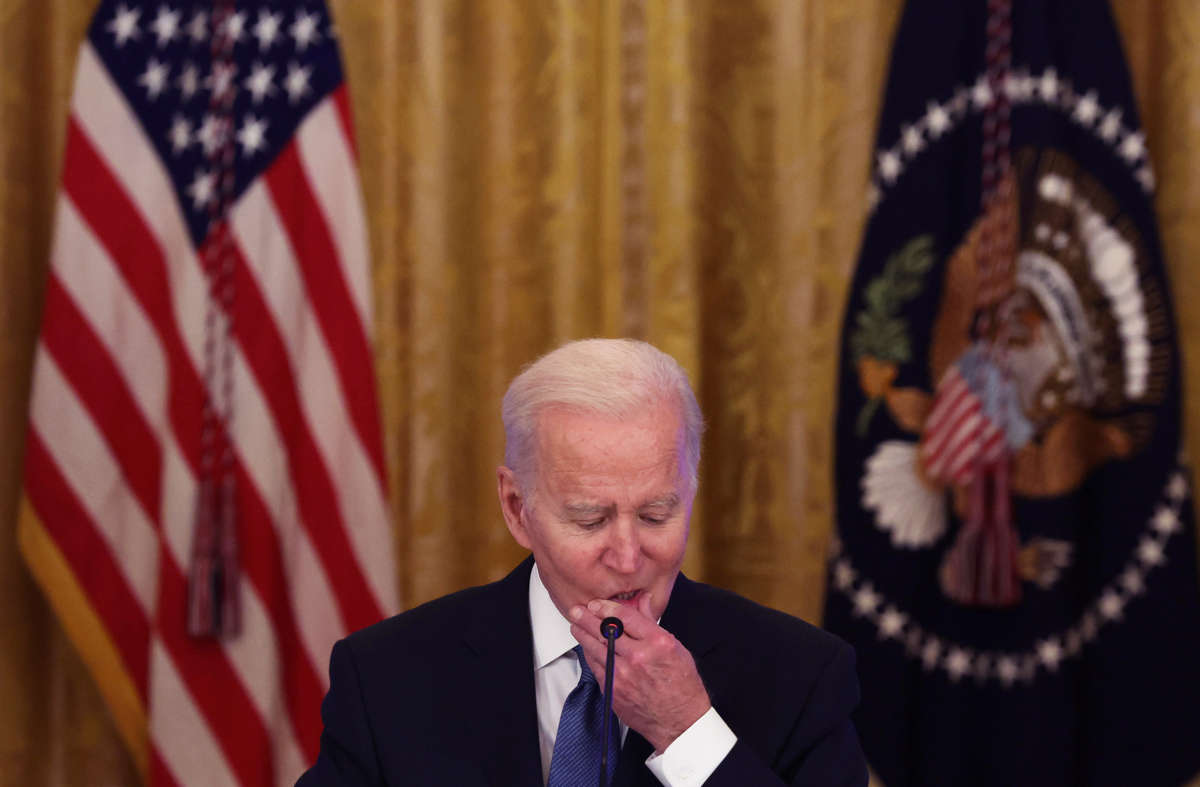In late January, the Saudi-United Arab Emirates (UAE) coalition carried out an airstrike on a prison in Yemen, killing more than 90 detainees and injuring many more. Among the rubble was a fragment of the weapon used to do it. On it was a Raytheon Technologies manufacturer code. A few days later, the CEO of Raytheon, Greg Hayes, was discussing the escalation of the war in Yemen and Ukraine when he said, “I fully expect we’re going to see some benefit from it.”
The Biden administration, ignoring its promises about Yemen from a year ago, is embracing the escalation of the war as they refuse to suspend any support to Saudi Arabia. Raytheon, a company that sees profits from the war in Yemen, gave President Joe Biden’s presidential campaign over half a million dollars in 2020.
In early November of 2021, the Biden administration announced a massive arms sale of $650 million worth of medium-range missiles and missile rail launchers to Saudi Arabia. The primary contractor for these weapons is Raytheon.
Aisha Jumaan, the Yemeni founder of Yemen Relief and Reconstruction Foundation, called out the responsibility of arms supplying companies like Raytheon, saying, “I would like to ask Greg Hayes, what would you say to the family members of those who were killed by your weapons? How would you feel if your family was targeted by these arsenals?”
Finding United States-manufactured weapons in Yemen is nothing new. In 2018, a bomb later identified as a Lockheed Martin product was dropped on a Yemeni school bus, killing more than 40 children.
When people discuss who is winning the war in Yemen, the answer will never be the Houthis, Saudi Arabia, or the UAE. Weapons companies funded by the U.S. taxpayer through Pentagon contracts are who’s winning the war. Weapons manufacturers that reinvest their money into political campaigns like President Biden’s are who’s winning the war.
With Saudi Arabia remaining the number one buyer of weapons from the U.S, these companies make millions — sometimes billions — of dollars arming the Saudi-UAE led coalition, and Biden took campaign donations from all of them. According to OpenSecrets, Biden’s campaign took $527,010 from Raytheon, $447,047 from Lockheed Martin, $726,873 from Boeing, $416,276 from Northrop Grumman, and $237,104 from General Dynamics.
U.S. companies are coming out on top at the expense of 30 million Yemenis, and the president’s political campaigns benefit from the companies’ ability to make so much money off conflict.
On February 4 of last year, President Biden announced to the world that the U.S. would be ending “offensive” support for the war in Yemen. Peace activists rejoiced for a moment but were quick to ask Biden what “offensive” really meant. What wasn’t “offensive” about Saudi Arabia and the UAE waging war and maintaining a blockade on a sovereign country like Yemen? Activists asked him what the announcement meant. Members of Congress asked for clarification as well. They never got answers. A year later, bombs are raining down on Yemen’s main cities while the flow of weapons from the U.S. to Saudi Arabia remains unimpeded, and manufacturing codes of Biden’s campaign donors are still found in the rubble left behind by war crimes.
On the anniversary of Biden’s announcement promising to end offensive support to Saudi Arabia, the situation on the ground is worse than ever. Airstrikes have gone up in the first year of Biden’s presidency, compared to former President Donald Trump’s last year in office. Fuel and food are still not allowed to flow freely into Yemen because of the Saudi blockade. Fuel shortages are causing hospitals to risk losing power as they try to treat the countless children who are malnourished. Worst-case estimates say that a child dies every 75 seconds in Yemen.
Blaming Biden for his refusal to act isn’t enough now. His campaign donors like Raytheon and Lockheed Martin benefit from the carnage. Their executives feel comfortable enough with that fact to admit it openly in their meetings.
In 2018 and 2019, when President Trump refused to act, Democrats and some Republicans in Congress made it a point to pass a War Powers Resolution to signal to the White House that Congress does not consent to the U.S.’s role in Yemen. Lawmakers in Congress must introduce and pass a new War Powers Resolution for Yemen soon if they are serious about ending U.S. complicity in the war.
Join us in defending the truth before it’s too late
The future of independent journalism is uncertain, and the consequences of losing it are too grave to ignore. To ensure Truthout remains safe, strong, and free, we need to raise $46,000 in the next 7 days. Every dollar raised goes directly toward the costs of producing news you can trust.
Please give what you can — because by supporting us with a tax-deductible donation, you’re not just preserving a source of news, you’re helping to safeguard what’s left of our democracy.
